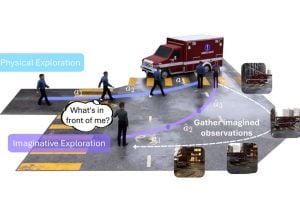Tianmin Shu is an assistant professor of computer science at the Johns Hopkins University with a secondary appointment in the Department of Cognitive Science. He also directs the Whiting School’s Social Cognitive AI Lab and is a member of the Data Science and AI Institute.
Shu’s research goal is to advance human-centered artificial intelligence by engineering machine social intelligence to build systems that can understand, reason about, and interact with humans in real-world settings. He approaches this goal from an interdisciplinary perspective, connecting machine learning, computer vision, robotics, and social cognition to study machine social intelligence. His current work includes model-based Theory of Mind reasoning and social scene understanding, neurosymbolic methods for multimodal embodied assistance, and continual and social learning for machine social intelligence. He is also interested in developing principled computational models that uncover the cognitive mechanisms underlying human social intelligence in a grounded, physical world.
Shu’s work has received the Cognitive Science Society’s 2017 Computational Modeling Prize in Perception/Action, a 2020 Best Paper Award at the Conference on Neural Information Processing Systems Cooperative AI and Shared Visual Representations in Human and Machine Intelligence Workshops, and an Excellent Paper Award at the 2022 IEEE/RSJ International Conference on Intelligent Robots and Systems Workshop on Cognitive and Social Aspects of Human Multi-Robot Interaction. His research has also been covered by multiple media outlets, such as New Scientist, Science News, and VentureBeat.
Shu obtained a PhD in statistics (2019) from the University of California, Los Angeles, and a BS in electronic engineering (2014) from Fudan University. Before joining JHU, he was a postdoctoral associate (2019 to 2023) and a research scientist (2023) at the Massachusetts Institute of Technology.



